#Yoruba religion
Photo
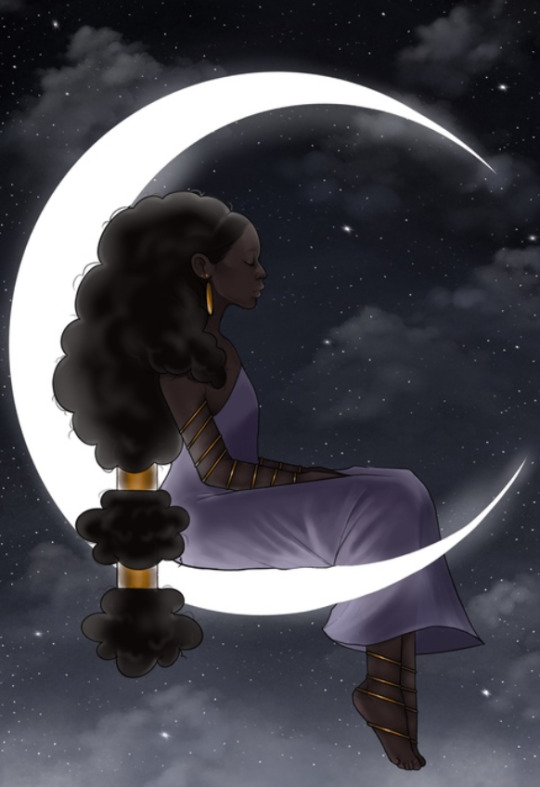
"Mawu Orisha" by Adesewa Adekoya
1K notes
·
View notes
Photo

Oshunmare/Oxumare by Nelson Boeira Faedrich
2K notes
·
View notes
Text
Remember even in the darkest times you are never alone
The spirits, your ancestors, and the Orishas themselves walk beside you
With them by your side nothing can block your path for long
Ashe
#Orisha#African powers#Santeria#Ifa#Yoruba#yoruba religion#Ellegua#Obatala#ogun#Shango#Oba#Oya#Yemaya#Oshun#Olokun#Babaluaye#Ashe#Ancestors#400+1#Cuban#Mexican#Protectors#Olodumare#haitian vodou#Loa
71 notes
·
View notes
Text
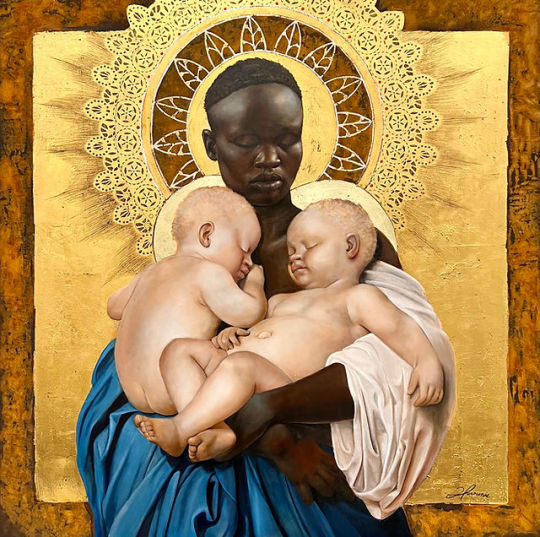
Harmonia Rosales, Yemaya with Ibeji, 2022, oil on wood panel, 36” × 36”.
#harmonia rosales#afrolatina artist#women artists#yoruba#yoruba religion#yemayá#yemanjá#orisha#orishas
99 notes
·
View notes
Text
IS IFA INITIATION (ITEFA) RIGHT FOR YOU?

I get asked about Ifa initiation often by clients seeking to embrace this tradition. It has become a popular topic of discussion throughout the diaspora community. It tends to be a big deal among the African diaspora because we have been separated from our traditions for so long. And many want to connect with them as quickly and deeply as possible. So, they often consider initiation early on in their journey.
But what many aren’t aware of is that initiation is not required for everyone. It is a beautiful and blessed part of an Ifa spiritual journey. But this process is not mandatory to enjoy a fruitful and beneficial spiritual practice. So, it’s definitely not something you must rush into.
Even more, many don’t realize that all Ifa devotees in Yorubaland don’t go through initiation. Instead, some only receive the Hand of Ifa and continuously work with their Orisa icons. This is because everyone is not called to initiate. In fact, it is a rarity for initiation to be a requirement for anyone. Contrarily, it is primarily a personal choice for the average person.
SHOULD YOU INITIATE?
Initiation into the Ifa tradition is a powerful and significant event in the lives of those who practice it. This ancient and sacred ritual, referred to as Itefa, involves a complex set of prayers, ceremonies, sacrifices, and offerings. Those who are initiated into the Ifa tradition are granted access to higher-level spiritual teachings and knowledge. Likewise, they tend to have stronger connections to Ifa and specific Orisas once they endure this process. So there are many benefits to initiating into the Ifa tradition.
But keep in mind that this is not the only way to achieve higher spiritual connection and communication. In fact, some people are naturally born with such abilities without going through this specific process. Instead, these individuals endure initiation through personal circumstances and challenges that give them a similar level of spiritual connectivity.
Beyond having basic knowledge of what initiation is and its benefits, there are other considerations you need to think about before making such a move. I have outlined a few of them below.
COST OF INITIATION
One of the first things to consider before initiating is the cost of this process. For the average person, paying initiation fees can be quite exorbitant. While prices vary, I have seen costs between $5,000-$30,000 for various types of Ifa initiation ceremonies.
And keep in mind that these fees typically only include elements related to the initiation. You will typically have to pay your own airfare and other transportation-related costs if traveling for such an endeavor. However, room and board may be included in your initiation fees. So, you should definitely ask about this element and be prepared for it before taking this step.
GODPARENT SELECTION
Before you initiate, you need to have a strong connection with and understanding of the individual who will be initiating you. Likewise, you should be familiar with the other initiates and members of the temple where you plan to initiate. Though it’s not mandatory for you to like every member of the temple, you should have a decent relationship with them for the most part.
Beyond the semantics of social dynamics, the Babalowo (Priest) or Iyanifa (Priestess) who conducts your initiation should be qualified to do so. As such, you should take your time to get a feel for the quality of the individual’s work beforehand. This is usually done by getting divination and ebo performed regularly to determine the effectiveness of such solutions.
POST-INITIATION REQUIREMENTS
Keep in mind that initiation doesn’t automatically make a person righteous, infallible, or all-knowing. Nor is a person considered a spiritual leader simply because they initiate. There are additional requirements beyond initiation that set the stage for one’s spiritual growth and development.
Initiates are expected to learn and practice the teachings of Ifa and adhere to its moral code. Also, they must live with respect for their ancestors, community, and environment. Becoming an initiate also means taking on certain responsibilities as part of your role in the community. These responsibilities include maintaining a strong connection with the Orisa and honoring tradition. You must also serve as a bridge between the spiritual and physical worlds for others who may require your assistance.
Initiation is only the beginning of a joyous, transformative existence. Though it may come with ups and downs, it is meant to be the start of a cataclysmic change in your life. It is not the peak or conclusion of such a journey, as your process of spiritual growth and development is never-ending.
OUTCOMES OF ITEFA
Aside from the above-mentioned benefits of initiation, the following list outlines what you can expect from the process:
A rebirth process that further integrates you into the Ifa tradition
A holistic understanding and profound knowledge of Self
Comprehensive understanding of personal taboos
Deeper knowledge about your existence, purpose, and path
Enhanced relationship with and connection to your Head Orisa
Ability to overcome extreme or unrelenting difficulties and hardships
WHEN SHOULD YOU INITIATE?
The decision to initiate is very personal. As outlined above, it should be made with careful consideration. But beyond these factors, the choice of when to initiate should be made based on when you are ready to do so. No one should ever pressure you to initiate, even if it comes up in a reading. And keep in mind that it is a rarity for someone’s reading to indicate that they must initiate.
Instead, some of the best Babalawos and Iyanifas I have worked with often discourage new devotees from initiating too soon. That is unless it is a matter of life and death, which is not typical. Usually, these individuals won’t initiate someone until they deem the individual ready for such a process.
Unfortunately, in today’s world, some people use unscrupulous tactics to pressure others into initiation. Typically, they will say that initiation is a requirement or that something bad will happen to the person if they don’t initiate right away. Or they will otherwise compel them into going through the process. But note that such practices are not part of the Ifa tradition.
Contrarily, people are usually encouraged to wait until they feel ready for initiation. This may take months, years, or decades. Or it may never come to fruition. And that’s perfectly fine. Anyone considering this path should do so when they are spiritually, mentally, emotionally, and financially ready for it.
10 notes
·
View notes
Text
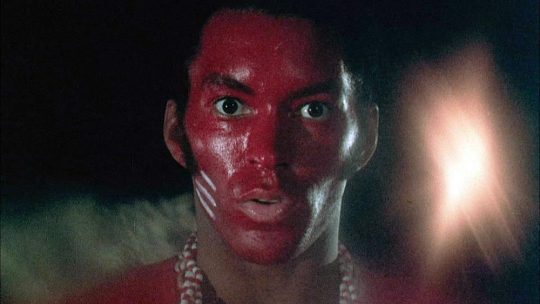
Lord Shango (1975)
by Ray Marsh
5 notes
·
View notes
Text
Learning about Oya made me like Storm even more and not just because she’s the black girl on the X-Men 😊
6 notes
·
View notes
Text
Today in Black History Month, the Yoruba and the Diaspora religions they inspired:
The Yoruba have accomplished the not at all small feat of holding onto the most well-preserved traditional African religion in present times against the twin juggernauts of Islam and of Islamic Jihads against infidels, and Christian and cultural Christian colonialism.
The Orishas and the world they inhabit are one that are very much alive and living, and mark a path worthy of respect for the grit and determination to keep it as it is.
1 note
·
View note
Text
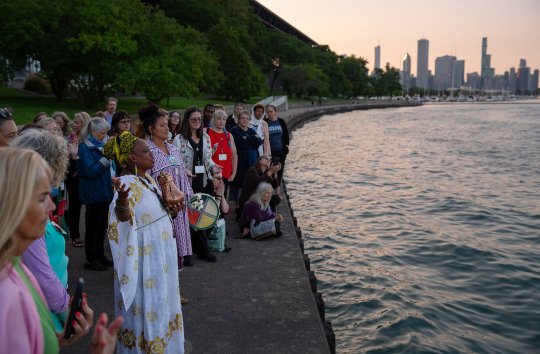
August 15, 2023: Yoruba priestess Aina-Nia leads a water ceremony by Lake Michigan as part of the Parliament of the World's Religions in Chicago. During the ceremony, which recognized the sacredness of water, water from different parts of the world was combined and poured into the lake.
Photo by Lauren Pond
#religion#yoruba#priestess#people#holy water#parliament of the world's religions#united states#divinum-pacis#interfaith
131 notes
·
View notes
Photo
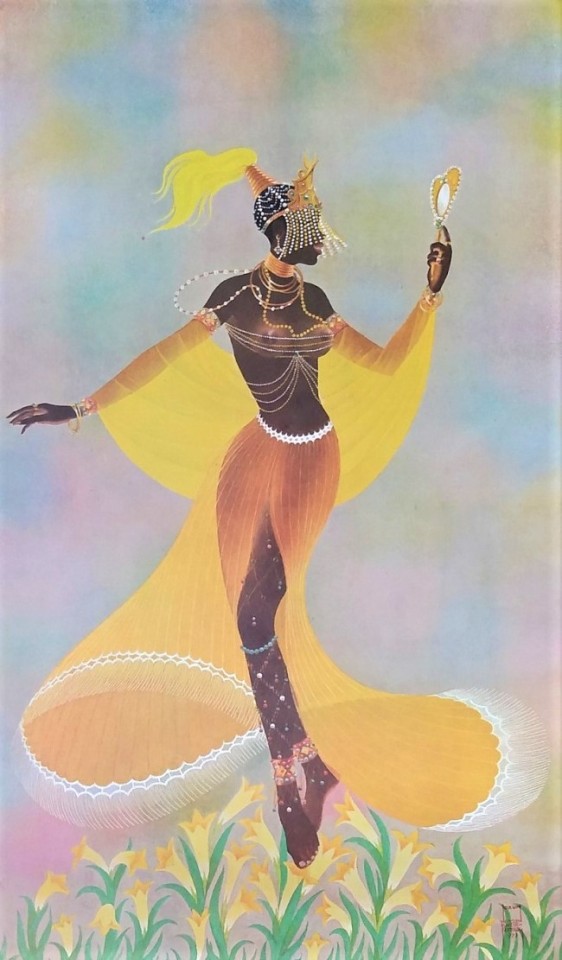
Oshun by Nelson Boeira Faedrich
1K notes
·
View notes
Text
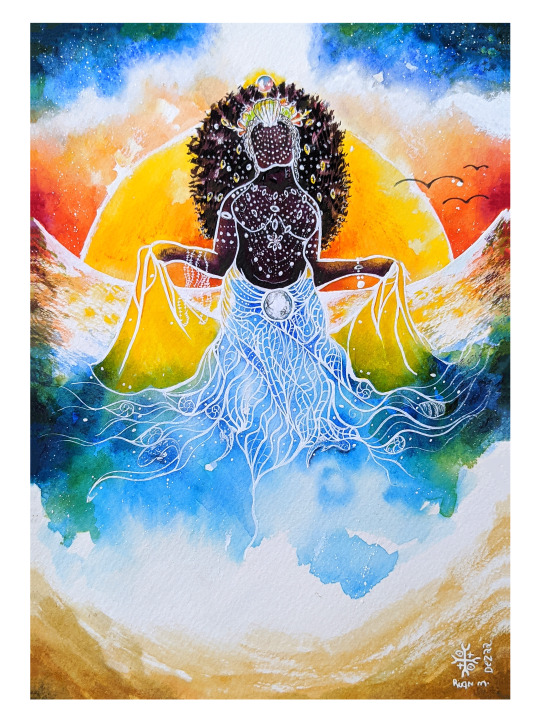
Yemaya by Kypris Aquarelas
#paganism#polytheism#pagan#goddess#deity#art#religion#yemaya#iemanjá#yemoja#mami wata#mother goddess#umbanda#ocean#god#yoruba#dandalunda#mikaia#samba#brazil#brasil#watercolor#watercolour#candomblé#santeria#voodoo#nkisi#inquice#orixá#orisha
81 notes
·
View notes
Photo
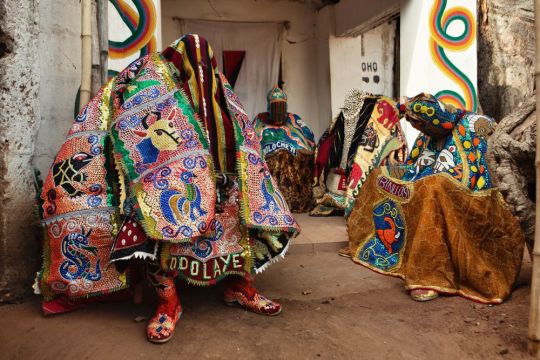
“I saw giants” by Àsìkò
#Àsìkò#egun#egungun#ancestors#Africa#Black spirituality#ATR#African Traditional Religion#African Spirituality#African Diaspora#eggun#spirituality#Orisa#Orisha#I saw giants#Yoruba
198 notes
·
View notes
Text
ILEKE BEADS IN THE IFA TRADITION
Ileke beads, sometimes referred to as Ifa or Orisha beads, are a type of beaded jewelry that can be found in Nigeria and other parts of Africa. The word ileke means “bead” in the Yoruba language. Seeds, beans, and stones are kneaded together to form these elaborate fetishes. The beadwork is created by stringing together ornate objects of various shapes and sizes to form patterns.
These totems are used by some people as a form of currency, while others use them for religious or spiritual purposes. Notably, ileke beads are an important part of the Ifa religion and other African traditional religions. They are used in many ceremonies and rituals similar to rosary beads in other religions like Islam, Catholicism, Buddhism, etc.

COLOR MEANINGS AND ORISHAS
Ileke beads come in a variety of colors and styles. However, the most common color is white, as it can be used for various deities or Orishas. However, they can also be found in a mixture of black, green, red, and other colors that symbolize different Orishas.
Here are some examples below:
White for Aje
Yellow for Oshun
White for Obatala
Red and black for Eshu
Green and black for Ogun
Green and yellow for Orunmilia
Note that the color of the beads associated with each Orisha can vary by house and tradition. For instance, Ogun is often represented by the color red in diasporic traditions like Lucumi and Santeria, etc. So, you may find discrepancies in the colors as outlined above.
THE PURPOSE OF THESE TOTEMS
The ultimate purpose of ileke beads is for spiritual protection. They ward off evil spirits and bring good luck. The Yoruba people believe that they have spiritual power. They are a symbol of wisdom and knowledge and are used in many ceremonies and rituals. These spiritual totems are also said to be blessed by the gods, which makes them even more special.
An Ifa devotee should always wear ileke beads on the wrist or around the neck. These blessed adornments can protect the wearer from the conspiracy of enemies and onlookers. They can also keep death at bay and sickness away.
Ileke beads should be consecrated by an Ifa priest or priestess in order to serve their primary function. They can be bought from spiritual suppliers and practitioners. However, they won’t possess the essence of an Orisha or spirit unless they are consecrated or blessed.
WHERE TO FIND ILEKE BEADS
If you want to wear ileke beads, it is best to consult with an Ifa priest or priestess to see if they are appropriate for you. They can be worn by anyone, but it is important to ensure that they are consecrated when using them for spiritual purposes. Also, you should be aware of any taboos associated with wearing these totems before purchasing them.
If you are interested in learning more about ileke beads and the Ifa religion, you can purchase them in our online store. You can also visit a local Ifa temple or shrine to see ileke beads in person.
5 notes
·
View notes
Text
So the thing with Tems had me thinking a little bit.
More Black people who were raised Christian and left the religion are turning towards Ifá/Santeria/Candomblé or Òriṣà worship in general for many reasons.
Just know that not all Yoruba people are open to that. colonization did it's thing at demonizing that practice to many people. I'm part of the lucky few Yoruba people who's family still respects our heritage and honour the Òriṣà even though most practice Islam or Christianity. My dad side is still a Ṣàngó house, my mum side Ọṣun house.
If you meet a random Yoruba person and start talking about Òriṣà they might call it idol worshipping and rebuke it in the blood of Jesus Christ because they might be Catholic or something. Or they might say there is no God other than Allah because they are Muslim.
As a Yoruba person not even I would assume some respected the traditional religions. I have had arguments with fellow Yorubas and Igbos and other ethnic groups in Nigeria and West Africa while waving around the novel Things Fall Apart
It's just something to keep in mind.
39 notes
·
View notes